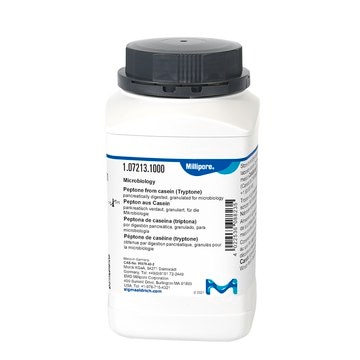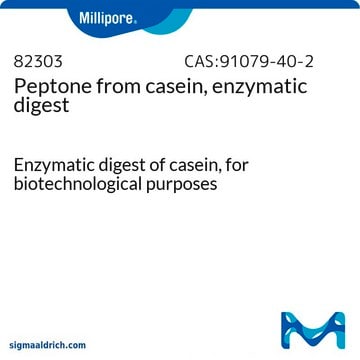T9410
Casein Peptone
Enzymatic digest of casein from bovine milk, 11.4-13.9% total nitrogen, suitable for biotechnology and microbiology
Synonyme(s) :
Peptone from casein, Peptone from casein, casein tryptic digested, Tryptone
About This Item
Produits recommandés
product name
Tryptone, Pancreatic digest of casein, Suitable for microbiology
Source biologique
bovine milk
Niveau de qualité
Forme
powder
Conditionnement
poly bottle of 1 kg
poly bottle of 250 g
Dosage de l'azote
11.4-13.9% total
Perte
≤11% loss on drying
pH
6.6-7.4
Application(s)
microbiology
Vous recherchez des produits similaires ? Visite Guide de comparaison des produits
Description générale
Application
Code de la classe de stockage
11 - Combustible Solids
Classe de danger pour l'eau (WGK)
WGK 1
Point d'éclair (°F)
Not applicable
Point d'éclair (°C)
Not applicable
Équipement de protection individuelle
Eyeshields, Gloves, type N95 (US)
Faites votre choix parmi les versions les plus récentes :
Certificats d'analyse (COA)
Vous ne trouvez pas la bonne version ?
Si vous avez besoin d'une version particulière, vous pouvez rechercher un certificat spécifique par le numéro de lot.
Déjà en possession de ce produit ?
Retrouvez la documentation relative aux produits que vous avez récemment achetés dans la Bibliothèque de documents.
Les clients ont également consulté
Notre équipe de scientifiques dispose d'une expérience dans tous les secteurs de la recherche, notamment en sciences de la vie, science des matériaux, synthèse chimique, chromatographie, analyse et dans de nombreux autres domaines..
Contacter notre Service technique












